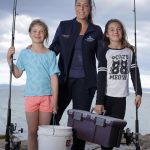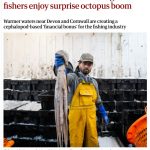Examples of ‘opportunities’ that have emerged because of climate-driven changes
QUESTION
Are there any examples of ‘opportunities’ that have emerged because of climate-driven changes? How have these been managed to maximise the benefits?
ANSWER 1
Written response:
Although many impacts of climate change will be negative, there are certainly some examples of ‘opportunities’ emerging. One such ‘good news story’ playing out right now is the octopus boom in UK Waters that is a surprising win for some parts of the fishing sector.
Climate-driven changes on fish stocks can be complex, but in some cases, they can be positive for a given region. For example, UK fishers are celebrating an unexpected surge in octopus populations—a phenomenon that’s offering a timely boost to coastal economies and reshaping some of the narrative around climate-driven marine change.
Once considered a sporadic catch in British waters, octopus is now appearing in record numbers. Fishers in Devon and Cornwall report hauling in up to 50 octopuses a day, a dramatic increase attributed to warming sea temperatures that have made UK waters more hospitable to species like the curled octopus (Eledone cirrhosa).
This boom is more than just a biological curiosity—it’s an economic opportunity. Octopus commands high market value, especially in southern Europe, and UK fishers are now tapping into this lucrative export market. Some vessels have reported a doubling of profits, with one fisher describing the experience as “like finding treasure on the seabed.”
But capitalizing on this opportunity requires more than luck—it demands coordination. The Devon and Severn Inshore Fisheries and Conservation Authority (D&S IFCA) has already revised escape gap rules in pot fisheries to ensure sustainable harvesting. These regulatory shifts are essential to protect juvenile octopuses and maintain healthy stocks.
What’s becoming increasingly clear is that opportunities like this can only be maximized through collaboration and communication between fishers, managers, and researchers. Fishers provide real-time insights from the water, researchers interpret ecological trends, and managers craft responsive policies. Together, they form a feedback loop that enables agile, informed decision-making. This is exactly what we are trying to encourage here in Australia with the Sea Change Australia project!
This octopus boom is a compelling case study in marine adaptability and human responsiveness. It demonstrates how species can shift dynamically in response to environmental changes—and how our industries must evolve in tandem. For researchers and policymakers, it’s a reminder that climate change impacts are complex: sometimes disruptive, sometimes unexpectedly beneficial.
However, Spanish fishers, facing declining local stocks, view the UK glut as both a challenge and an opportunity. While some advocate for increased imports, others warn of market saturation. These international dynamics further highlight the need for cross-border dialogue and shared strategies.
For the UK fishing sector, this is a good news story worth celebrating. It showcases the resilience of coastal communities, the importance of responsive regulation, and the power of collaboration in unlocking new market opportunities. As our oceans continue to change, stories like this offer hope—and a valuable lesson in adaptation and teamwork.
This answer was drafted based on the following news articles, and the image below is from the Guardian article:
Supporting gallery:
Answered by:

